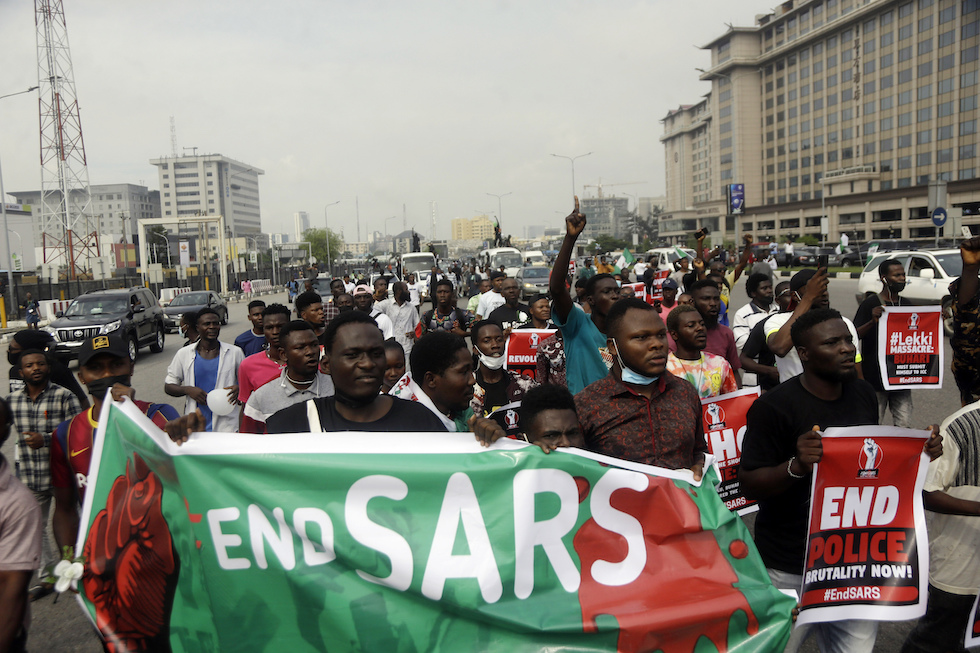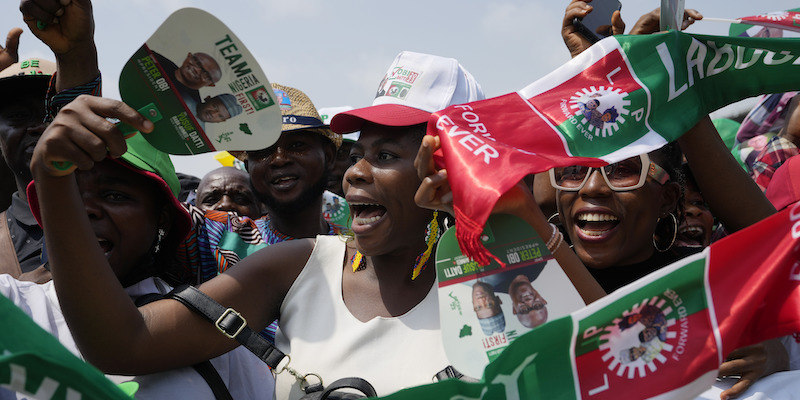Saturday 25 February there will be votes to elect the new president and to renew the parliament in Nigeria, one of the largest and most important countries in Africa and the sixth largest in the world by population (213 million inhabitants). Nigeria is a very young country: the 70 percent of the population is under 30 years old (in Italy it is 28%) and the average age is 18: the result of the elections will therefore depend very much on the consensus gained in this segment of the population.
The younger electorate is in some ways the most affected by the failures of outgoing President Muhammadu Buhari. There widespread feeling of many young people, according to surveys and research, is that they have not been taken into consideration by the governments that have followed one another so far, perceived as incompetent and corrupt. The most important issues for this segment of the electorate are economic growth and the labor market, but also more lateral issues around which large and participatory protests have arisen in recent years, such as police violence.
A large part of the younger Nigerian electorate is part of the so-called “generation of democracy”: that is, those born after 1999, the year in which Nigeria ended a turbulent period of governments interrupted by coups, which began immediately after the country gained independence from the United Kingdom in the 1960s. It is a generation that has not known regimes and has grown up in an all in all democratic context, with periodic elections.
– Listen also: Globo’s episode on the elections in Nigeria, with Giovanni Carbone
What makes this generation so relevant in these elections is not only its numerical size or the fact that it may be more or less fond of democracy than others (a question on which there are also many doubts). Its importance is also due to the fact that it seems to be much less aligned and predictable than others in the expression of its vote, and at the same time very eager for change.
In recent decades Nigerian politics has been dominated above all by two parties: the centre-right People’s Democratic Party and the centre-right Progressive Congress to which outgoing President Buhari also belongs. The political positioning of the parties is actually rather unstable, because the political forces respond above all to ethnic and religious affiliations, or to loyalty to certain leaders.
Second According to Afrobarometer, a Ghana-based research center that surveys across the continent, two-thirds of Nigeria’s registered new voters do not have strong ties to either party. The favorite among the younger ones seems to be rather a third candidate, unrelated to the two parties that have dominated Nigerian politics so far: Peter Obi, the candidate of the centre-left Labor Party, which precisely because of the novelty he represents is attracting a lot of attention both in Nigeria and abroad.
This is one of the most discussed and notable aspects of these elections: their outcome is much more uncertain than it has ever been in the past, so much so that there is discussion of the possibility that for the first time in the history of Nigeria there will be a second round of voting, which is triggered when a candidate does not obtain a majority of votes in at least two thirds of the more than 30 states that make up the country.
Obi is 61 years old and the youngest of the three main candidates (Atiku Abubakar of the People’s Democratic Party is 76 and Bola Tinubu of the Progressive Congress is 70). He is a wealthy businessman who has built a reputation as a pragmatic and reliable person, capable of implementing necessary and long-awaited reforms, and who has also set the tone of his campaign on his own frugality. He is a relevant aspect in Nigerian politics, which until now has also been dominated by the ostentation of one’s wealth and in many cases by corruption.
Peter Obi (AP Photo/Kin Cheung)
A central theme for many young voters concerns the growth of the labor market. According to the Nigerian statistics office, unemployment and underemployment affect about half of the population, two-thirds considering only the youngest. Nigerian analyst Leena Koni Hoffmann, of the British research center Chatham House, told al Financial Times that it is precisely the economic conditions in Nigeria that have prompted so many young people to register to vote this year.
Furthermore, 28 per cent of the newly registered are students, another category very affected by this type of problem, given that those who have the possibility of studying are very often forced to emigrate in order to work: in Nigeria there has been discussion for some time about the so-called “Brain drain”. It’s a theme that Obi insists on for yearsand what has resumed on multiple occasions during his election campaign.
– Read also: All the problems of Muhammadu Buhari’s presidency in Nigeria
Another central theme for many young people is the serious and deep-rooted problems of insecurity, mainly due to internal territorial conflicts and frequent attacks and kidnappings by criminal or terrorist groups. The perception of many is that the government has so far been unable to propose solutions to this type of problem, and that the tools used have actually ended up creating others.
For example, in recent years there have been large and participatory protests against the police in Nigeria, concentrated above all in the so-called “movimento End SARS” (SARS is an acronym for Special Anti-Robbery Squad, a unit of the Nigerian police created in 1992 to deal with crimes such as robberies, thefts and kidnappings).
The movement, made up mainly of young people, was born in 2017 to protest against the frequent abuses committed by SARS agents against Nigerian civilians, to then expand and become a more transversal protest against the inefficiency and incapacity of the Nigerian government. In 2020, the movement had organized a series of large mass protests in all major Nigerian cities, considered unprecedented and followed by several solidarity demonstrations abroad as well.
The End SARS movement’s anti-government protests were “one of the few things young Nigerians agree on,” he told the Financial Times the Nigerian journalist Jola Ayeye, referring to the extreme ethnic, cultural and religious diversity of Nigeria. The protests had been repressed with violence and several protesters had been killed. The government had also imposed a seven-month block on Twitter, which like other social networks had played a very important role in organizing and disseminating the demonstrations.
Obi has exploited the theme of police violence in his election campaign: during a rally in early February, for example, he said that if elected he will undertake to reform the police, with training programs that make them less violent. He also said he wanted to “apologize” to all the victims of the police violence.

A protest by the End SARS movement (acronym for a local police unit) in Nigeria (AP Photo/Sunday Alamba)
In general, the size and weight of the youth electorate greatly influenced the tone of the Nigerian electoral campaign. For example, Tinubu had the capital Lagos plastered with signs in which he promised to “lend a hand” to the Nigerian technology sector, one of the most promising in the country. Abubakar said he wanted to work to stem the abandonment of the country by many young people.
